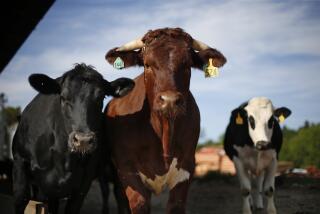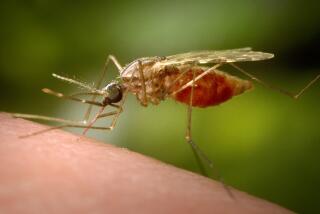Vaccine Controls AIDS in Monkeys, Researchers Find
- Share via
An AIDS vaccine tested in monkeys fails to keep the animals from becoming infected but prompts their bodies to mount a powerful defense that keeps the disease in check, researchers report.
In a study in today’s Science, researchers say that rhesus monkeys inoculated with the vaccine, then injected with AIDS virus, developed a strong army of immune system cells that attacked and controlled the infection. The animals, in effect, did not become ill.
The results suggest, but do not prove, that a similar vaccine developed for humans and now in the early stages of testing might be effective in controlling HIV, said Dr. Norman Letvin, senior author of the study. The effectiveness in humans, however, may take years to determine.
The special vaccine was made with a combination of DNA taken from HIV and SIV, an AIDS virus that infects only monkeys. The virus used to test the vaccine was also a laboratory-made combination of the two viruses.
This DNA vaccine was boosted with interleukin-2 (IL-2), an immune system protein, and an antibody called IgG.
Letvin said the combination of monkey and human DNA was used to get results quickly. If natural viruses were used, he said, “the disease course would be so slow that it would be many years” before there were results.
Critics noted the vaccinated monkeys were selected for a genetic profile that was most likely to respond to the vaccine, and that the vaccine and virus were very closely matched genetically--situations that would not occur in nature.
They also noted the IL-2 and IgG used as a booster have the potential for creating a variety of troubling side effects and are unlikely to be used in a widespread vaccination program in humans.






